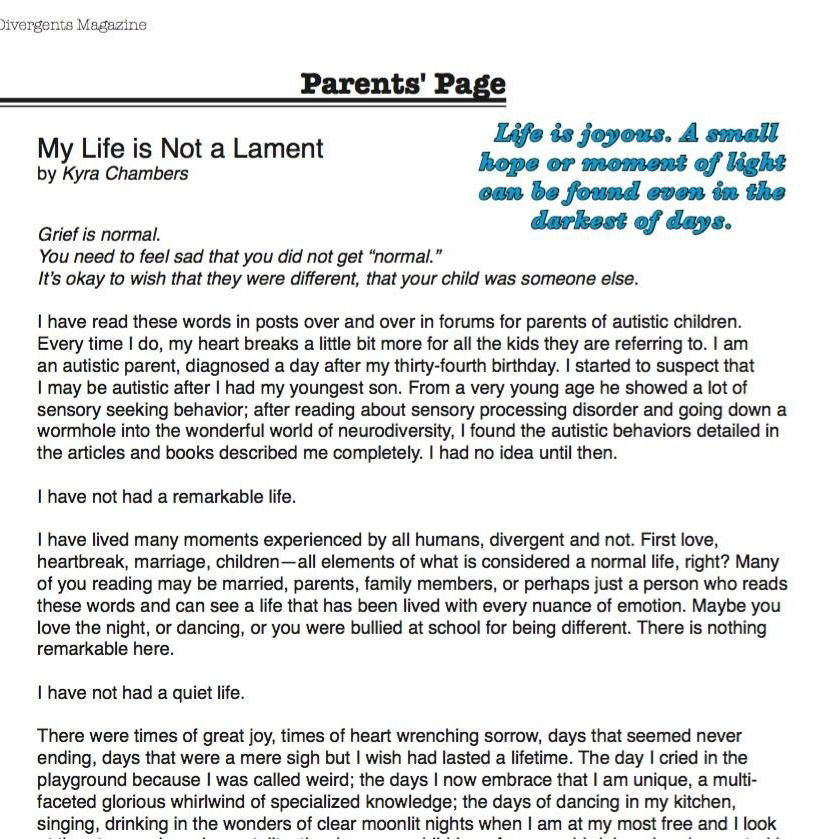My Life Is Not a Lament

by Kyra Chambers
Grief is normal.
You need to feel sad that you did not get “normal.”
It’s okay to wish that they were different, that your child was someone else.
I have read these words in posts over and over in forums for parents of autistic children. Every time I do, my heart breaks a little bit more for all the children they are referring to. I am an autistic parent, diagnosed a day after my thirty-fourth birthday. I started to suspect that I may be autistic after I had my youngest son. From a very young age he showed a lot of sensory seeking behavior; after reading about sensory processing disorder and going down a wormhole into the wonderful world of neurodiversity, I found the autistic behaviors described in the articles and books described me completely. I had no idea until then.
I have not had a remarkable life.
I have lived many moments experienced by all humans, divergent and not . First love, heartbreak, marriage, children—all elements of what is considered a “normal” life, right? Many of you reading may be married, parents, family members, or perhaps just a person who reads these words and can see a life that has been lived with every nuance of emotion. Maybe you love the night, or dancing, or you were bullied at school for being different. There is nothing remarkable here.
I have not had a quiet life.
There were times of great joy, times of heart wrenching sorrow, days that seemed never ending, days that were a mere sigh but I wish had lasted a lifetime. The day I cried in the playground because I was called weird; the days I now embrace that I am unique, a multi-faceted glorious whirlwind of specialized knowledge; the days of dancing in my kitchen, singing, drinking in the wonders of clear moonlit nights when I am at my most free and I look at the stars and see immortality; the days as a child I ran free as a bird, loved and accepted by my family; and the days I have to hide in my bedroom for an hour because the overstimulation of two loud children, and televisions, and all the other noise that crests inside my head washes over the ability to cope physically and mentally; the wonderful day my fierce and passionate daughter was born; the day I married my husband, who is always forgiving of a wife who constantly loses things and cannot ever be on time; the day my youngest son was born, my shiny sun in nature as well as in name.
This is not a life of grief.
Like some of you reading this, I have experienced loss. The death of a grandparent, a great-grandparent, a friend, a work colleague. My first son—a child who now talks to me in the whisper of the wind and the drumming of the rain as I type this. An unexpected loss, we shared only thirty-two hours before it was time to let go. Years of love and memories to be made, stolen from us by chance. Eleven years, a lifetime and a single heartbeat in one. There is a part of me that forever will be missing holding the hand of a blonde boy with sapphire eyes and his mother’s nose. That pretty picture still does not change the depths of grief the soul plummets through when you make the decision to turn off the life support keeping your child in a semblance of life. To weigh the scales between what is futile hope and what is reality, what is selfish and what is right. Of living with survivor’s guilt, to think you killed your child.
I look at my rainbow children and find joy, happiness, but also a taste of bittersweet regret as I watch a quiet miracle unfold; they play a game together and I look 6 inches above at the picture of my forever young son. A part of our family he will always be, but my days have always been a shade darker since the day I said goodbye. His was a life unfulfilled. To never feel a mother’s cuddle, a lover’s kiss, or to watch their grandchildren grow before them. Not even a first birthday. Is this not tragedy?
After this, how can I not be pained when I read the words of parents who say they grieve the living, breathing existence of their children because they did not sign up for a disabled child? A child who is selectively mute and needs to use written communication. A child who struggles to contain their joy and who spins and shouts “too loudly,” or one who needs solitude and hides in their room away from all family and too much stimulation. A child who cries at the party they did not want, who is called selfish because they will not share a treasured best soft toy friend, who is struck into the cast of “that naughty kid.” For all their challenges, my children—and all the ones I read about in those forums—get to experience things my deceased child never will. The wind, the sun. Things he never knew or saw.
Accept your children for the people they are. They have a lifetime to learn and love and you are one of the biggest influences in their lives. Fill their days with love and acceptance, with understanding and compassion. Listen to their voices and seek out other autistic people and truly listen. Listen to our songs of embracing ourselves, of positivity and encouraging the autistic self. We do not sing a dirge of intensive therapies to teach compliance and masking of the soul, that itself is a little death, hidden under quiet hands. Come and listen to our songs of support, of joy and color, with a depth of emotion and understanding that is in every single way just as nuanced and capable as every person reading these words.
Save your grief and lamentation for the dead. For a life taken before due time, something lost and never regained. Life is joyous. A small hope or moment of light can be found even in the darkest of days. Celebrate your children’s lives while they are with you. Do not waste time with shame and regret when they are right there. Trust me when I say every moment is a gift.
